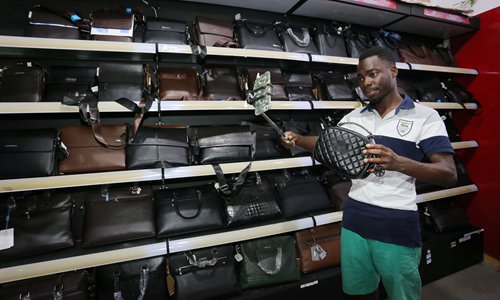
From the People’s Daily app.
This is Story in the Story.
As China became a hot pick for international students, the country released policies to create more job opportunities for international students.
The Chinese government has been introducing a number of exploratory changes allowing international students in Beijing and Shanghai to take part-time jobs or internships off campus as long as they obtain approval from their academic institutions and the entry and exit administrative authorities.
In early 2017, the central government introduced a program for international students with postgraduate degrees or who had attended "well-known" universities to obtain Chinese work permits after graduation.
Previously, international students and those with degrees obtained overseas had to have a minimum of two years' work experience outside China before they could apply for a work visa.
Australian student Thomas Linnette described the relaxed policies as a "welcome change" and said he expects there will be a large increase in students seeking part-time jobs and new graduates seeking employment in China.
While many international students are interested in seeking a job with a Chinese employer after graduation, some other international students are starting up their own business to explore the business opportunities in China and in their home countries.
Today’s Story in Story will look at how an African student in China sells Chinese products back home through live broadcasting.

Wale is live broadcasting the information about a handbag in a shopping mall. (Photo: IC)
Wale, the 29-year-old grandson of a king in Benin, has become a popular daigou, a person who buys products in China on behalf of consumers in other countries and takes commissions.
Wale is a graduate student at Huzhou University, in East China's Zhejiang Province. He started his business early last year and has been selling Chinese products like smartphones, computers, shoes, clothes and household appliances to his hometown back in Africa. These Chinese goods are very popular among Benin locals for their good quality and low prices.
Wale began selling Chinese smartphones even before he came to China. He chose to study in Huzhou, after hearing the city has a thriving wholesale market and is close to commercial center Yiwu.
He planned to grow his business as he studies in China. Wale quickly learned Chinese, a skill which helps him communicate smoothly with the locals, particularly when bargaining with his suppliers.
At first, he just wanted to make some pocket money. Later, due to increasing demand from Benin clients, he started to treat it as a serious business.
He now live broadcasts the information about products while shopping, and directly communicates with buyers.
Wale has been using social networks like Facebook, WeChat and Taobao to release information. On Facebook, for example, most of his posts are videos that demonstrate every detail of a product. His clients are not only from African countries like Benin, Congo and Ethiopia but also from the US, France and Spain. To better communicate with his clients, he has learned five foreign languages.
Wale is no different from many other African students who choose to work as daigou while studying in China. But Wale has a bigger ambition of expanding his business.
He's thinking of finding a factory to produce customized products. In addition, he's hoping to sell products from his hometown, like gold and hazelnuts, to China, using the Belt and Road initiative.
(Produced by Nancy Yan Xu, Terry Guanlin Li, Raymond Mendoza, and Lance Crayon. Music by: bensound.com. Text from Xinhua and Global Times.)


